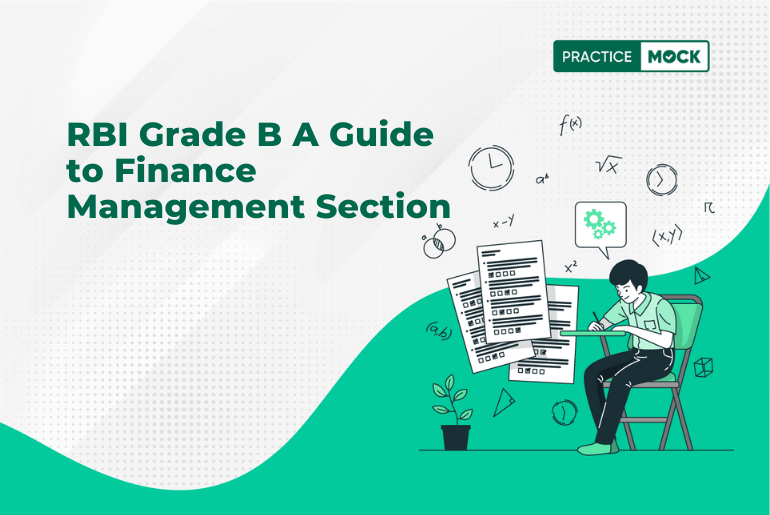RBI Grade B A Guide to Finance Management Section: The Finance Management section is a crucial component of the Reserve Bank of India (RBI) Grade B examination, assessing candidates’ knowledge and understanding of financial concepts and principles. This section evaluates candidates’ proficiency in various financial topics, including financial markets, financial institutions, banking regulations, monetary policy, and economic developments. To excel in this section, candidates need a thorough understanding of key concepts and the ability to apply theoretical knowledge to real-world scenarios.
Understanding the Syllabus
Before delving into preparation, it’s essential to understand the syllabus of the Finance Management section. The syllabus typically covers topics such as financial markets, financial institutions, banking regulations, financial instruments, monetary policy, fiscal policy, international financial institutions, and economic developments. Familiarizing yourself with the syllabus helps in identifying the scope of the examination and prioritizing topics for preparation.
Mastering Financial Concepts
To succeed in the Finance Management section of the RBI Grade B exam, candidates must have a strong grasp of fundamental financial concepts. This includes understanding financial statements, financial ratios, risk management techniques, capital budgeting, working capital management, and financial analysis. Candidates should focus on building a solid foundation in these concepts through study materials, textbooks, online resources, and practice questions.
Staying Updated with Current Affairs
Staying updated with current affairs related to finance and economics is crucial for the Finance Management section. Candidates should regularly follow financial news, economic indicators, government policies, and global economic developments. Understanding the implications of current events on financial markets, monetary policy, and banking regulations is essential for answering application-based questions in this section.
Practicing Numerical Problems
Numerical problems are a significant component of the Finance Management section. Candidates should practice solving numerical problems related to financial calculations, financial ratios, time value of money, bond valuation, stock valuation, and capital budgeting. Regular practice enhances problem-solving skills, improves accuracy, and boosts confidence in tackling numerical questions during the exam.
Analyzing Case Studies
The Finance Management section often includes case studies that assess candidates’ ability to analyze complex financial situations and make informed decisions. Candidates should practice analyzing case studies related to financial institutions, investment decisions, risk management, and regulatory compliance. Developing analytical skills and the ability to apply theoretical knowledge to practical scenarios is essential for excelling in this aspect of the examination.
Revision and Mock Tests
Effective revision is crucial for consolidating learning and retaining information. Candidates should allocate dedicated time for revision, focusing on key concepts, formulas, and theoretical frameworks. Additionally, taking mock tests and solving previous years’ question papers helps candidates familiarize themselves with the exam pattern, assess their preparation level, and identify areas for improvement.
Seeking Guidance and Clarification
Candidates preparing for the Finance Management section should not hesitate to seek guidance from mentors, teachers, or subject matter experts. Clarifying doubts, discussing challenging concepts, and seeking guidance on exam preparation strategies can significantly enhance candidates’ understanding and confidence in tackling this section.
Conclusion
The Finance Management section of the RBI Grade B exam requires thorough preparation, conceptual clarity, and application-based learning. By understanding the syllabus, mastering financial concepts, staying updated with current affairs, practicing numerical problems, analyzing case studies, revising effectively, and seeking guidance, candidates can enhance their preparation and excel in this section of the examination. A structured and disciplined approach to preparation is key to achieving success in the RBI Grade B Finance Management section and realizing career aspirations in the banking sector.
- Sign Up on Practicemock for Updated Current Affairs, Free Topic Tests and Free Mini Mocks
- Sign Up Here to Download Free Study Material
Free Mock Tests for the Upcoming Exams
- RRB PO 2024 Free Mock Test
- RRB Clerk 2024 Free Mock Test
- SSC MTS Free Mock Test
- SSC CHSL Free Mock Test
- SSC CGL Free Mock Test
- GATE Mechanical Free Mock Test
- GATE Civil Free Mock Test
- NABARD Gr. A Free Mock Test
- SBI Clerk Mains Free Mock Test
- SSC CPO Free Mock Test
- AFCAT Free Mock Test
- CAT Free Mock Test
- NIACL Assistant Free Mock Test
- UIIC AO Free Mock Test
- UIIC Assistant Free Mock Test
- GIC Assistant Manager Free Mock Test
- NICL AO Free Mock Test
- Free SSC Live Test
- UPSC CSAT Free Mock Test
- CDS-I Free Mock Test
- RRB ALP Free Mock Test


